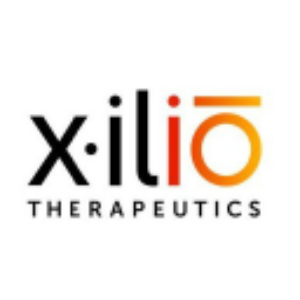Xilio Therapeutics Announces Late-Breaking Phase 2 Data for Vilastobart in Patients with MSS mCRC and High Plasma Tumor Mutational Burden at Society for Immunotherapy of Cancer (SITC) 40th Annual Meeting
Rhea-AI Summary
Xilio Therapeutics (NASDAQ: XLO) reported late-breaking Phase 2 data for vilastobart plus atezolizumab at SITC on Nov 7, 2025 showing a 40% objective response rate (ORR) in heavily pre-treated patients with MSS metastatic colorectal cancer (mCRC) who had no liver metastases and high plasma TMB (≥10 mut/Mb).
Data cutoff was May 12, 2025: 44 patients treated (100 mg Q6W vilastobart + 1200 mg Q3W atezolizumab), 27 without liver metastases, 24 evaluable for plasma TMB. Company estimates ~55% of non‑MSI‑H CRC are plasma TMB‑high. Responses included tumor reductions up to 71%. Safety: mostly Grade 1–2, 5% discontinued for treatment‑related AEs and 7% experienced colitis. Xilio will host a conference call/webcast on Nov 10, 2025 at 4:30 p.m. ET.
Positive
- 40% ORR in MSS mCRC patients without liver metastases and high plasma TMB
- 55% estimate of non‑MSI‑H CRC patients are plasma TMB‑high (GuardantINFORM analysis)
- Tumor reductions up to 71% from baseline
- Low discontinuation: 5% stopped for treatment‑related AEs
Negative
- Small plasma TMB evaluable cohort: 24 patients
- Significance is marginal: correlation p=0.05
- Efficacy reported only in patients without liver metastases, limiting generalizability
News Market Reaction
On the day this news was published, XLO declined 2.96%, reflecting a moderate negative market reaction. Argus tracked a peak move of +2.4% during that session. Our momentum scanner triggered 8 alerts that day, indicating moderate trading interest and price volatility. This price movement removed approximately $1M from the company's valuation, bringing the market cap to $43M at that time. Trading volume was above average at 1.9x the daily average, suggesting increased trading activity.
Data tracked by StockTitan Argus on the day of publication.
Estimate
Company to host conference call and webcast on Monday, November 10, 2025, at 4:30 p.m. ET with leading cancer experts to review the data
WALTHAM, Mass., Nov. 07, 2025 (GLOBE NEWSWIRE) -- Xilio Therapeutics, Inc. (Nasdaq: XLO), a clinical-stage biotechnology company discovering and developing tumor-activated immuno-oncology therapies for people living with cancer, today announced new data from its ongoing Phase 2 clinical trial evaluating vilastobart, a tumor-activated, Fc-enhanced anti-CTLA-4, in combination with atezolizumab (Tecentriq®) in patients with microsatellite stable (MSS) metastatic colorectal cancer (mCRC). A
“These compelling new Phase 2 data for vilastobart in combination with atezolizumab demonstrated a
“These new data highlight the potential to use plasma TMB as a predictive biomarker and identify patients with MSS mCRC who may benefit from treatment with vilastobart, a tumor-activated anti-CTLA-4, in combination with a PD-(L)1,” said Diwakar Davar, M.D., Associate Professor of Medicine, Clinical Director of the Melanoma Program and Medical Oncologist/Hematologist at the UPMC Hillman Cancer Center. “This biomarker guided approach, utilizing a feasible and reproducible biomarker, together with vilastobart’s differentiated safety profile, continue to support the promising opportunity for vilastobart in combination with PD-(L)1 or PD1-VEGF in MSS mCRC, as well as other tumor types.”
Promising Opportunity for Plasma-Based TMB as a Biomarker Predictive of Response to Combination Treatment with Vilastobart in Patients with MSS mCRC
Tissue-based TMB has demonstrated potential as a biomarker predictive of response to immune checkpoint inhibitors in many tumor types. However, tissue-based TMB assays have not shown predictive utility in MSS mCRC historically, and these tissue-based assays may underestimate the mutational burden in patients. In particular, tissue-based assays are limited to evaluating mutations in a single-site biopsy specimen, which is typically taken once at the time of diagnosis, and cannot account for tumor heterogeneity or changes in TMB over time.
Newer plasma-based assays show potential to better assess TMB status and be used as a biomarker predictive of response in patients with MSS mCRC. These plasma-based assays are more sensitive than traditional tissue-based assays in that plasma-based TMB assays provide a comprehensive assessment of mutational load and account for tumor heterogeneity. In addition, plasma can be readily obtained from blood samples throughout the course of treatment, accounting for changes in TMB over time without the need for invasive procedures.
Approximately
These data support the meaningful opportunity to use plasma-based TMB as a biomarker predictive of response to combination treatment with vilastobart in patients with MSS mCRC.
New Data from Phase 2 Trial for Vilastobart in Combination with Atezolizumab in Patients with MSS mCRC Without Liver Metastases and with High Plasma TMB
As of a data cutoff date of May 12, 2025, 44 patients with MSS mCRC had been treated with the combination of vilastobart at 100 mg once every six weeks (Q6W) and atezolizumab at 1200 mg once every three weeks (Q3W), including 27 patients without liver metastases. Patients were heavily pre-treated, with
In a retrospective analysis, 24 patients without liver metastases were evaluable for plasma TMB status. Baseline plasma TMB was assessed using the Guardant360 Liquid (Infinity) assay, and patients with TMB ≥10 mutations/Mb were defined as having high plasma TMB.
Clinical Efficacy Data
40% ORR in plasma TMB-high patients, consisting of six partial responses (PRs), with five confirmed PRs (with one confirmed after the data cutoff date) and one unconfirmed PR.- In patients evaluable for plasma TMB status,
62.5% were TMB-high. All responders who were evaluable for plasma TMB status were TMB-high, and the correlation between plasma TMB status and response was statistically significant (p=0.05). - As previously reported, responses were deep and durable, with reductions in target lesions of up to
71% from baseline.
Safety Data
Vilastobart in combination with atezolizumab continued to demonstrate a differentiated and generally well-tolerated safety profile. Treatment-related adverse events (AEs) were primarily Grade 1 or 2, consistent with the tumor-activated design for vilastobart.
As previously reported, across all patients treated as of a data cutoff date of May 12, 2025 (n=44), the combination of vilastobart at 100 mg Q6W and atezolizumab at 1200 mg Q3W was generally well-tolerated. Treatment-related AEs were primarily Grade 1 or 2. Only two patients (
Clinical Development Plans for Vilastobart
Based on the promising clinical activity and safety profile demonstrated by vilastobart as a combination therapy, including in patients who had high plasma TMB, Xilio is actively seeking a partner to develop vilastobart in combination with PD-(L)1 or PD1-VEGF in MSS CRC and other tumor types.
Investor Conference Call Information
Xilio will host a conference call and webcast on Monday, November 10, 2025, at 4:30 p.m. ET. The webcast will feature a discussion with expert clinicians Aparna Parikh, M.D., Associate Professor of Medicine, Harvard Medical School, Program Director, GI Medical Oncology, Colorectal, Anal, and Neuroendocrine, Director of the MGB Global Cancer Care Program, Mass General Brigham Cancer Institute, Boston, MA, and Diwakar Davar, M.D., Associate Professor of Medicine, Clinical Director of the Melanoma Program and Medical Oncologist/Hematologist at the UPMC Hillman Cancer Center, Pittsburgh, PA. During the webcast, Xilio will discuss the new Phase 2 combination data for vilastobart and the promising opportunity to use high plasma TMB as a predictive biomarker for response, as well as briefly highlight additional data updates presented at SITC across the company’s portfolio of differentiated masked immunotherapies.
Viewers can access the webcast by using this link. Listeners are encouraged to join at least 15 minutes prior to the scheduled start time. The webcast will also be accessible under “Events & Presentations” in the “Investors & Media” section of the Xilio Therapeutics website at ir.xiliotx.com. A replay of the webcast will be archived on the website for 30 days following the presentation.
About Vilastobart and the Phase 1/2 Combination Clinical Trial
Vilastobart is an investigational tumor-activated, Fc-enhanced, high affinity binding anti-CTLA-4 monoclonal antibody designed to block CTLA-4 and deplete regulatory T cells when activated in the tumor microenvironment (TME). In 2023, Xilio entered into a co-funded clinical trial collaboration with Roche to evaluate vilastobart in combination with atezolizumab (Tecentriq®) in a multi-center, open-label Phase 1/2 clinical trial. Xilio is currently evaluating the safety of the combination in Phase 1C dose escalation in patients with advanced solid tumors and the efficacy and safety of the combination in Phase 2 in patients with microsatellite stable (MSS) metastatic colorectal cancer (mCRC) with and without liver metastases. Please refer to NCT04896697 on www.clinicaltrials.gov for additional details.
About Xilio Therapeutics
Xilio Therapeutics is a clinical-stage biotechnology company discovering and developing tumor-activated, or masked, immuno-oncology (I-O) therapies with the goal of significantly improving outcomes for people living with cancer without the systemic side effects of current I-O treatments. The company is leveraging its proprietary platform to advance a pipeline of novel, tumor-activated I-O molecules that are designed to optimize the therapeutic index by localizing anti-tumor activity within the tumor microenvironment. Learn more by visiting www.xiliotx.com and follow us on LinkedIn (Xilio Therapeutics, Inc.).
Cautionary Note Regarding Forward-Looking Statements
This press release contains forward-looking statements within the meaning of the Private Securities Litigation Reform Act of 1995, as amended, including, without limitation, statements regarding the potential for plasma-based TMB as a predictive biomarker for response in patients with MSS mCRC; the potential for vilastobart to provide benefit as a combination therapy in patients with MSS mCRC or any other indication; the ultimate efficacy and safety profile of vilastobart; the plans and ability to partner the vilastobart program; and Xilio’s strategy, goals and anticipated financial performance, milestones, business plans and focus. The words “aim,” “may,” “will,” “could,” “would,” “should,” “expect,” “plan,” “anticipate,” “intend,” “believe,” “estimate,” “predict,” “project,” “potential,” “continue,” “seek,” “target” and similar expressions are intended to identify forward-looking statements, although not all forward-looking statements contain these identifying words. Any forward-looking statements in this press release are based on management’s current expectations and beliefs and are subject to a number of important risks, uncertainties and other factors that may cause actual events or results to differ materially from those expressed or implied by any forward-looking statements contained in this press release, including, without limitation, risks related to general market conditions and geopolitical uncertainties; risks and uncertainties related to ongoing and planned research and development activities, including initiating, conducting or completing preclinical studies and clinical trials and the timing and results of such preclinical studies or clinical trials; the delay of any current or planned preclinical studies or clinical trials or the development of Xilio’s current or future product candidates; Xilio’s ability to obtain and maintain sufficient preclinical and clinical supply of current or future product candidates; Xilio’s ability to advance multiple early stage masked T cell engager programs; initial, preliminary, interim, or retrospective preclinical or clinical data or results may not be replicated in or predictive of future preclinical or clinical data or results; Xilio’s ability to successfully demonstrate the safety and efficacy of its product candidates and gain approval of its product candidates on a timely basis, if at all; results from preclinical studies or clinical trials for Xilio’s product candidates may not support further development of such product candidates; actions of regulatory agencies may affect the initiation, timing and progress of current or future clinical trials; Xilio’s ability to obtain, maintain and enforce patent and other intellectual property protection for current or future product candidates; Xilio’s need to obtain additional cash resources to advance its pipeline of tumor-activated I-O molecules; the impact of international trade policies on Xilio’s business, including U.S. and China trade policies; and Xilio’s ability to maintain its collaboration or partnership agreements with AbbVie, Gilead and Roche. These and other risks and uncertainties are described in greater detail in the sections entitled “Risk Factor Summary” and “Risk Factors” in Xilio’s filings with the U.S. Securities and Exchange Commission (“SEC”), including Xilio’s most recent Quarterly Report on Form 10-Q and any other filings that Xilio has made or may make with the SEC in the future. Any forward-looking statements contained in this press release represent Xilio’s views only as of the date hereof and should not be relied upon as representing its views as of any subsequent date. Except as required by law, Xilio explicitly disclaims any obligation to update any forward-looking statements.
This press release contains hyperlinks to information that is not deemed to be incorporated by reference in this press release.
Tecentriq® is a registered trademark of Genentech USA, Inc., a member of the Roche Group.
Investor Contact
Alex Lobo, Precision AQ
alex.lobo@precisionaq.com
Media Contact
Josie Butler, 1AB
josie@1abmedia.com








